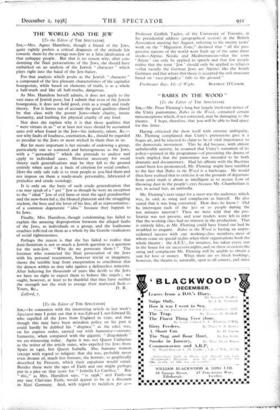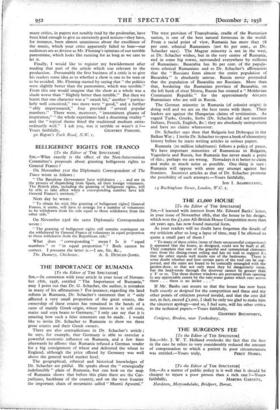BABES IN THE WOOD "
[To the Editor of THE SPECTATOR] SIR,—Mr. Peter Fleming's long but largely irrelevant notice of the Unity pantomime, Babes in the Wood, contained certain misconceptions which, if not corrected, may be damaging to the theatre. I hope, therefore, that you will be able to find space for this letter.
Haying criticised the show itself with extreme ambiguity, Mr. Fleming complained that Unity's pretensions give it a bogus air, and he rejected its claim to be of vital importance to the democratic movement. This he did because, with almost unbelievable naivety, he assumed that Unity's statement of its policy—printed in the programme—of presenting the drama of truth implied that the pantomime was intended to be both dramatic and documentary. Had his affinity with the Bactrian camel been less pronounced, Mr. Fleming might have tumbled to the fact that Babes in the Wood is a burlesque. He would then have realised that to criticise it on the grounds of departure from strict truth is about as intelligent as to accuse Low of throwing dust in the people's eyes because Mr. Chamberlain is not, in actual fact, an umbrella.
Mr. Fleming's next target for a sneer was the audience, which was, he said, as smug and complacent as himself. He also stated that it was long converted.. How does he know ? Did he interrogate each of the 300 or so people during the ten minutes interval ? Then we were told that the pro- letariat was not present, and your readers were left to infer that the working class had no interest in the production. That is entirely false, as Mr. Fleming could have found out had he troubled to enquire. Babes in the Wood is having an unpre- cedented success with our working-class members, most of whom come on special nights when their organisations book the whole theatre : the A.E.U., for instance, has taken every seat in the house for six successive nights, and on these occasions the smug and complacent Mr. Fleming will be unable to obtain a seat for love or money. When there are no block bookings, however, the theatre is, naturally, open to all corners, and since many critics, in papers not notably read by the proletariat, have been kind enough to give us extremely good notices—they have, for instance, been almost unanimous, about the excellence of the music, which your critic apparently failed to hear—our audiences are as diverse as Mr. Fleming's opinions of our terrible pantomime, which looks like running for as long as we care to let it.
Finally, I would like to register my bewilderment after reading that part of the article which was relevant to the production. Presumably the first business of a critic is to give his readers some idea as to whether a show is one to be seen or to be avoided. Mr. Fleming started by saying that " the politics were slightly better than the pantomime, which was terrible." From this one would imagine that the show as a whole was a shade worse than " Slightly better than terrible." But then we learnt that one character was a " smash hit," another " particu- larly well conceived," two more were " good," and a further " ably impersonated," four provided " several popular numbers." There were, moreover, " intermittent gleams of inspiration," " the whole experiment had a disarming vitality " and the " topical theme fitted the traditional medium extra- ordinarily well." I ask you, was it terrible or wasn't it ?-
Yours faithfully, GEOFFREY PARSONS. so Regent's Park Road, N.W. 1.



























































 Previous page
Previous page